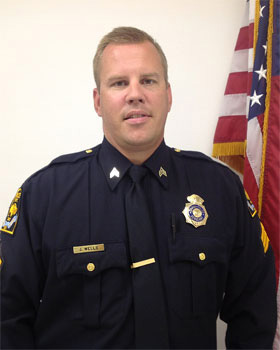Omaha Police Officers Association
Message from the Omaha POA President, Sgt. John Wells
On behalf of the over 750 dedicated men and women that make up the Omaha Police Department, we are proud to be founding members of PubSecAlliance.
Here in Omaha, if history has taught us anything it’s that a big city police department’s level of effectiveness is directly correlated to its level of connection and engagement within the community. Even under so called “normal conditions,” police work is a tough and fast-paced profession often burdened with an intense workload. Despite that, experienced police officers will tell you that healthy interaction and trust, between the police and the public we serve, makes their job easier.
Today’s challenges of city-wide gang and gun crime, in combination with a decreased level of police manpower, has made it more difficult than ever for police officers on the beat to find time to slow down and interact with the public in order to answer questions, build trust and strengthen relationships.
It is my deep desire, and full intention, with our new interactive web site we will do just that.
The Omaha POA website will better familiarize Omaha’s citizens not only with the men and women of the Omaha Police Department, but it will also be a “one shop stop” for concerned citizens to get constantly updated critical public safety information, as well as a means of offering feedback and enhanced dialogue.
Sgt. John Wells, President
Omaha Police Officers Association
The Omaha POA, a proud 80-year history

The Omaha POA’s goal is to professionally represent the over 750 sworn peace officers that comprise the Omaha Police Department. In order to achieve this goal, the OPOA strives to promote a high level of commitment to public safety and professionalism within the ranks of the OPD via an emphasis on education, legal support, community outreach and trust building.
Since 1934, there has been an organization dedicated to representing the professional men and women of the Omaha Police Department who protect and serve Omaha. Over the years, although the names may have changed, the commitment to excellence in service has remained the same. Today, that organization is known as the Omaha Police Officers Association.
So that the citizens of Omaha may enjoy an exceptional level of police protection by attracting and retaining the best and brightest police officers, balanced with a focus on the responsible use of tax dollars, the OPOA strives to ensure that the wages of OPD officers are competitive to those being paid to officers in similar cities facing similar crime and danger. This means that the OPOA is dedicated to ensuring that OPD officers salaries do not slip below, or rise above, the average of that paid to officers in similar cities. This approach is fair to hard working officers and taxpayers alike.
Omaha faces many challenges. With big city crime and the challenges of dangerous gang activity and violence comes the need to maintain a highly professional police force. The Omaha POA is committed to partnering with our community and city leaders to make Omaha a safer place and maintain it as a great city to live, work and raise a family.
Omaha POA in the news
How we saved our D.B. pensions
by Cynthia Brown, Publisher
American Police Beat
Sept/Oct 2014

Aaron Hanson, the former president of the Omaha POA, is determined to keep defined benefit pensions for his members and he may just succeed.
What if we told you there was a big city where five years ago the pension plan for police and fire was only 39% funded and actuaries were predicting bankruptcy in 20 years. Translation? In 20 years officers who retired from the police department after 25 to 30 years of service might get nothing at all.
Fast forward five years. That same fund is now close to 50% funded, 28% of the payroll deficit has been lowered to 1.5% and the pension fund is on track to be fully funded in 20 years. If you think this can’t be true, guess again.
Aaron Hanson, the former president of the Omaha Police Officers’ Association and one of the seven trustees of the City of Omaha Police and Fire Retirement System, said the results prove that if the officers understand and accept that they have to take a hit and share the sacrifice, a troubled pension plan can be turned around.
The bad news arrived in early 2008 – the Omaha Police and Fire Pension System was in serious trouble. The outgoing mayor took action and implemented a pension task force in 2009 to come up with some solutions.
“To his credit,” Hanson explains, “it was a balanced group. There were actuaries, lawyers, and accountants, along with representatives from the city and the police and fire unions. But there were more experts at the table than politicians and that helped.”
The POA began an intense effort to educate their members about the disaster on the horizon if extreme measures were not taken by both the city and the police and fire unions. There were endless meetings, news letters, postings on social media to let Omaha cops know the consequences of doing nothing.
To get the pension program back on track would require a whopping 27% of the police and fire payroll annually and even with that amount of money the fund would not be solvent for 35 years.
The big give-back on the cops’ side according to Hansen was the elimination of pension spiking. The new contract stipulates that retirement benefits are calculated on the highest one to three year average. A new tier for future employees eliminates overtime being factored into the retirement benefit.
“We cut our benefits for every single cop, we stopped spiking by introducing a career overtime average, and we paid in additional money,” Hanson said. “That brought our contribution up to 13.5 % of the payroll. The city agreed to contribute the other 13.5% which brought us up to the 27% extra the fund needed to survive.
“When we began our talks Omaha did not have a DROP plan,” Hanson continued. “But we worked with pension actuaries and designed a ‘cost neutral DROP’ which turned out to be cost-positive really. With our new innovative DROP plan we are paying off the unfunded liability and future pension benefits at the same time and our members had a new benefit that made it easier for them to accept the give-backs.”
Keeping your pension secure: Tips from Aaron Hanson
Have someone at the police association responsible for understanding what’s going on with the pension plan. Keep in touch with the politicians but stay close to the actuaries – they have the accurate information. Educate the public about what it means if police do not have a secure retirement and why the inevitable turnover in personnel will be a disaster in the law enforcement profession – a job that takes a lot of experience and training to do it well.
In our case city underfunded to get the short term financial gain and the trustees did not do their due diligence. Make sure the employer is paying what they should be into the fund. Stories of cities, towns, counties and states using money allotted for retirement funds for other projects are numerous – it should be illegal and has to stop.
Keep fighting back in every way you cab against the organizations and politicians who are committed to ending the defined benefit pensions. Our pension is back on the right track, but there is no coverage of this in the local media – they just keep focusing on the unfunded liability which is still at 50% but moving in the right direction.
Engage with politicians but stay close to the actuaries.














Connect with us
Connect with us on the following social media platforms.